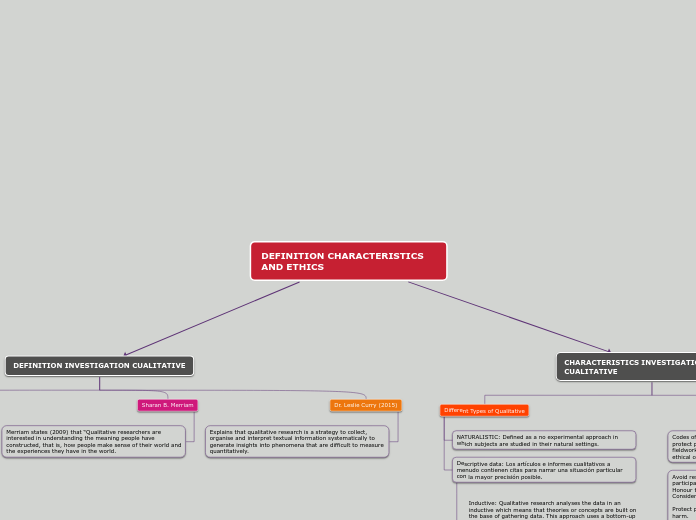DEFINITION CHARACTERISTICS AND ETHICS
DEFINITION INVESTIGATION CUALITATIVE
JOHN CRESWELL
John Creswell (1994) defines qualitative research as an inquiry process of understanding that is based on distinct methodological traditions of inquiry to explore a social or human problem
In this inquiry process, a qualitative research builds a complex and holistic picture, analyses words, reports detailed views of informants, and conducts the study in a natural setting.
Sharan B. Merriam
Merriam states (2009) that “Qualitative researchers are interested in understanding the meaning people have constructed, that is, how people make sense of their world and the experiences they have in the world.
Dr. Leslie Curry (2015)
Explains that qualitative research is a strategy to collect, organise and interpret textual information systematically to generate insights into phenomena that are difficult to measure quantitatively.
CHARACTERISTICS INVESTIGATION CUALITATIVE
Different Types of Qualitative
NATURALISTIC: Defined as a no experimental approach in which subjects are studied in their natural settings.
Descriptive data: Los artículos e informes cualitativos a menudo contienen citas para narrar una situación particular con la mayor precisión posible.
Inductive: Qualitative research analyses the data in an inductive which means that theories or concepts are built on the base of gathering data. This approach uses a bottom-up direction to understand situations, focus on behaviours, construct theories and reach conclusions.
Meaning: Element is to capture perspectives as precise as possible. For this, sometimes researcher’s interpretations will be checked with those of the participants; and even though this procedure is criticized, this reflects a deep concern to discover “what they are experiencing, how they interpret their experiences, and how they themselves structure the social world in which they live
Ethical considerations
Codes of ethics have to be set by researches in order to protect participants and support ethical approaches to fieldwork. Bodgan and Biklen highlight the following basic ethical considerations:
Avoid research sites where participants may feel coerced to participate in the research.
Honour the participants’ privacy.
Consider difference in participants’ time commitment.
Protect participants’ identities to avoid embarrassment or harm.
Treat participants with respect and seek their cooperation in the research.
Negotiate with the participants the terms of the agreement to do a study.
Tell the truth when writing up and reporting the findings.
